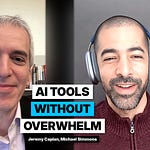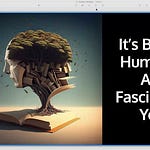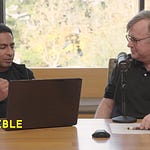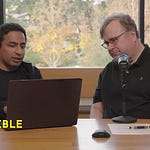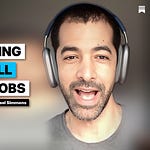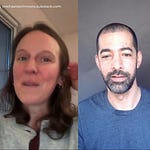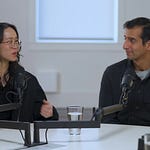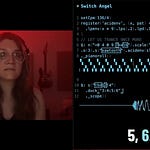Class Overview
What if the greatest discoveries about human potential aren't waiting to be invented, but waiting to be seen?
Just as van Leeuwenhoek's curiosity with a simple microscope revealed an entire universe of microorganisms thriving in a single drop of pond water—transforming our understanding of life itself. We now have AI as our conceptual microscope for exploring the vast, unmapped territories of human capability.
In our second Human Superintelligence session, we went deeper into "Possibility Prompting"—a method for using AI to explore not just what experts know, but what nobody has discovered yet.
Possibility Prompting is about collaborating with AI to map the unknown unknowns of human potential—the spaces that feel small and dark simply because we can't see into them, but in reality contain possibilities that make our current knowledge look like a grain of sand on a beach.
The breakthrough came when participants realized we're always just a few words away from reorienting our entire thinking on any domain. Possibility Prompting is the art and science of finding those words.
Using live demonstrations, I showed how two simple prompts—a portal prompt to access the unknown and a mapping prompt to chart the territory—can completely transform how we see possibilities in our work and lives. One participant connected spirituality and mathematics in ways they'd never imagined. Another discovered how to use AI to strengthen their intuitive coaching abilities rather than replace them.
What makes this approach revolutionary is that we're not just learning prompts—we're developing new ways of thinking with AI that create synthetic intelligence beyond what either humans or AI can achieve alone.
The paradigm shift is profound: instead of using AI as a prediction machine for known outcomes, we're using it as an exploration tool for emergent possibilities that require uncertainty, mystery, and curiosity to discover.
AI-Generated Podcast Summary Of The Class
RECORDING RESOURCES
Prompts Mentioned In Class
Presentation Slides
Class Transcript
Resources Shared
Classes In Track
AI Timestamps
AI Chapter Summaries
Chat Transcript
Prompts Mentioned In Class
Presentation Slides
Class Transcript
Resources Shared
Michael’s Claude Projects
People
Janet Risdale on LinkedIn
Michael Glenn on Substack - Veteran's Mental Health Advocate
Newsletter
Anna Gibson on Substack
Anna Gibson on LinkedIn
Leandra Williams on LinkedIn
Other
Resilient Veteran Alliance shared by Michael Glenn
The Absolute Beauty of Mathematics - London Tsai shared by Gordon Raup
Leadership Reality shared by Daniel Montgomery
Reality Labs AI Sprint shared by Daniel Montgomery
Curriculum Leadership Reality shared by Daniel Montgomery\
Classes In Human Super Intelligence Track of AI Thought Leader School
AI Timestamps
Introduction and Course Framework 0:00 - 3:06
Review of Possibility Prompting Paradigm 3:06 - 7:01
Blind Spots and Types of Intelligence 7:01 - 10:34
Historical Perspective: The Microscope Discoverer 10:34 - 15:24
Tools for Mapping the Unknown 15:24 - 22:46
Student Perspectives and Discussion 22:46 - 44:00
Creating Synthetic Language for AI 44:00 - 47:28
Q&A and Participant Questions 47:28 - 58:03
Portal and Mapping Prompts Demo 58:03 - 1:22:03
Emotional Processing and Reflection 1:22:03 - 1:28:00
Closing Thoughts and Encouragement 1:28:00 - 1:30:27
AI Chapter Summaries
Introduction and Course Framework (0:00 - 3:06)
Michael opens the second human superintelligence class by explaining the goal of using AI to explore latent human potential. He introduces the course structure, emphasizing that while he provides refined prompts as shortcuts, the deeper value lies in sharing the paradigms and ways of thinking about AI that led to those prompts. He frames this as developing a "way of thinking about AI" that makes every interaction more interesting, valuable, and fun, comparing it to teaching someone to fish rather than just giving them fish.
Review of Possibility Prompting Paradigm (3:06 - 7:01)
Michael reviews the concept of possibility prompting introduced in the previous week - a method for using AI to explore and map unknown territories of human potential. He contrasts this with how most people use AI to explore conventional wisdom or rare but known valuable ideas. Possibility prompting focuses on mapping "unknown unknowns" - the vast possibility space that makes current knowledge look like "a grain of sand on a beach." He gauges the group's interest level and notes they're a self-selected group excited about exploring this largely unexplored space.
Blind Spots and Types of Intelligence (7:01 - 10:34)
The discussion turns to different types of blind spots that possibility prompting can help identify: perceptual, cognitive, socio-cultural, temporal, emotional, and existential blind spots. Michael emphasizes how understanding blind spots in one's profession could lead to ideas others aren't considering. He mentions they could spend an entire year just on blind spots and demonstrates how this framework can be practically applied through customizable prompts.
Historical Perspective: The Microscope Discoverer (10:34 - 15:24)
Michael shares the story of Anthony van Leeuwenhoek, a draper (not a scientist) who discovered microbes by improving magnifying lenses for fabric inspection. This leads to a broader discussion about how tools for exploration in one domain can reveal entirely new worlds. He includes video clips of Neil deGrasse Tyson explaining Leeuwenhoek's discovery and Craig Venter discussing the hidden microbial diversity in ocean water, illustrating how tools help us map previously unknown spaces.
Tools for Mapping the Unknown (15:24 - 22:46)
Building on the microscope analogy, Michael explains different types of tools for exploring unknowns: detection tools (for discovering what's there), navigation tools (for orienting and moving through space), and access tools (for reaching difficult-to-access places). He applies this framework to AI and possibility prompts, suggesting different types of prompts serve these different functions. He then introduces a conceptual example through Eric Weinstein's podcast featuring mathematician-artist Landau Siegel, who visualizes higher-dimensional mathematical structures that exist beyond normal human perception.
Student Perspectives and Discussion (22:46 - 44:00)
Multiple students share their insights. Leandra discusses how the mathematician-artist example shows different people arriving at similar spiritual conclusions through completely different paths (math vs. intuition). Una talks about using AI to integrate different domains and create novel insights, while also noting the importance of fact-checking AI outputs. Daniel emphasizes moving beyond binary thinking and using AI as a therapeutic container for extended thinking and emergent strategy in his consulting work, stressing the importance of including all dimensions of life rather than compartmentalizing.
Creating Synthetic Language for AI (44:00 - 47:28)
Michael explains how their conversation is creating a new language and framework that becomes "synthetic data" for deeper AI conversations. By developing terms like "possibility prompting," "portal prompts," and "mapping prompts," they're creating tools that allow more sophisticated interactions with AI. He compares this to how Leeuwenhoek's spherical lenses were tools for the physical world - words with context become their equivalent tools for the conceptual space.
Q&A and Participant Questions (47:28 - 58:03)
Students share various applications and questions. Anna discusses methods for having AI think
Chat Transcript
00:01:08 Michael McGreevy: Yeehaw
00:01:08 Janet Ridsdale: Happy Friday
00:01:21 Jonathan Hughes: Good morning all
00:01:23 Janet Ridsdale: Still only audio unfortunately
00:02:46 faythebuchanan: Just off camera while I eat lunch.
00:03:21 Marcin Podolski: For me it is the most fascinating track
00:03:57 Dani Trusca: Replying to "For me it is the mos..."
For me as well
00:04:12 Michael McGreevy: Let's lay some eggs
00:04:20 Michael McGreevy: Sounds great
00:04:20 Exo: Replying to "Let's lay some eggs"
this
00:04:22 faythebuchanan: Fabulous! What a resource.
00:04:23 Leandra: LOVE it. That's exactly what I wanted out of it
00:04:23 Janet Ridsdale: YES!!
00:04:25 Marcin Podolski: For me AI augmented vertical development
00:04:28 Anna Gibson: super hype
00:04:31 Kevin Whitcher: What you do is so bespoke we need to adapt it
00:04:36 Steve Finegan: How can we use as many of our senses when we are processing information?
00:04:36 Malliha: Inspiring.
00:04:42 Gabriel: " Big beautiful Paradigms" 🙂 (joke with the wording. I'm not from the US)
00:05:09 Dani Trusca: I dream of architecting Human 2.0. This the perfect place to be for me.
00:05:25 Anna Gibson: i actually wanted to share a prompt with you guys that I developed from Michaels work perhaps we can ad it to the queue? I'm not a prompter though lol so maybe tweak it
00:05:29 Anna Gibson: Replying to "I dream of architect..."
me too man
00:06:06 Marcin Podolski: For me i want to implement these ideas to my own integral meta model "Integral Human Design "
00:06:39 Kevin Whitcher: Think the universe - it's big out there
00:06:41 Leandra: 10/10
00:06:43 Janet Ridsdale: 10
00:06:43 Stephen Hendricks: High.
00:06:46 Zain Haseeb: Very high
00:06:46 Tim: love the idea!
00:06:49 Mark Brown: High
00:06:50 Marcin Podolski: 10/10
00:06:50 Dani Trusca: Very high
00:06:50 faythebuchanan: Very high.
00:06:51 Michael McGreevy: High— front edge
00:06:52 Gabriel: Super high
00:06:54 Anna Gibson: Prompt (If this isn't okay Michael lemme know):Prompt:I want to turn the following idea into a clear, actionable, and teachable insight using Michael Simmons' framework. Break it down into these components:Why It Matters – Explain why this idea is important or urgent. What's the cost of ignoring or misunderstanding it?Core Idea – Define the idea in the simplest, clearest terms.How to Take Action – Offer a step-by-step method or framework to apply the idea in real life.The Research – Cite supporting studies, academic principles, or expert sources that validate the idea.Case Studies / Role Models – Give examples of people, historical figures, or companies that exemplify this idea.Packaging – Suggest compelling article titles, newsletter subject lines, or intros that would attract attention.Trademark Vocabulary – Create metaphors, coined phrases, or sticky language that make the idea memorable.
00:07:01 Anna Gibson: high as hell
00:07:02 Anna Gibson: lol
00:07:16 Stanley Wilson: Possibility prompting bends the idea of curiosity with AIand self
00:09:02 Jonathan Hughes: Let the dog in!
00:09:12 Marcin Podolski: Bezos' centries thinking forward
00:09:28 Kevin Whitcher: Get AI to sort your pooches out!
00:10:04 Dani Trusca: This connects with a project of mine. I call it the Mistakes Libray: I'm mapping all the mistakes of humanity. Blindspots are just a small subset.
00:10:05 Michael Simmons: https://blockbuster.thoughtleader.school/p/tell-me-where-ill-die-ai-prompt-use
00:12:10 Michael Glenn: I feel like the real magic in AI is not in you telling it what to do...
It's in you ASKING it what it can do.
00:13:02 Marcin Podolski: With AI Kuhn Circle can be significantly accelerated
00:13:35 Michael Simmons: Replying to "I feel like the real..."
Great quote!
00:14:28 Marcin Podolski: Replying to "This connects with a..."
Awesome. I like how U think🔥❤️
00:15:56 Marcin Podolski: All the tools are extensions of our senses
00:16:22 Anna Gibson: Yeah i get stuck a lot so this should help a ton
00:18:01 Jazzy: Replying to "I feel like the real…"
Wow that is really cool.
00:18:09 Michael Simmons: https://www.londontsai.com/drawing/view/582083/1/679314
00:21:02 Una Doyle: Business Coach (Double Your Profits): Wow, this is so interesting rabbit hole alert
00:21:49 Leandra: Replying to "Wow, this is so inte..."
Instead of trigger warnings, in this class we absolutely need rabbit hole alerts. 😂
00:22:17 Michael Glenn: Replying to "Wow, this is so in..."
Yes! I love that. I'm gonna start using that on LinkedIn 😂
00:22:49 Jonathan Hughes: Replying to "Wow, this is so inte..."
I was going to write my next post on Substack today. Oh well....
00:22:59 Jazzy: Replying to "I feel like the real…"
Mathematics always has been something fascinating to me, because it makes me wonder how the mental architecture was formed. It fascinates me how this mental architecture somehow helps to perceive something beyond.
00:23:02 Marcin Podolski: Transfer and transform knowledge between domains and process in every possible way with ai
00:23:29 Mark Brown: I'm thinking too small
00:24:06 Gordon Raup: Michael, can you share the link to that video?
00:24:12 Kevin Whitcher: There are limits to human knowledge… can AI transcend this is the question coming up for me? As it is in theory based upon what we can understand.
00:24:26 Dani Trusca: I have a design idea of a fractal messaging system that allows you to explore endless rabbit holes without losing the main thread. I want to build a prototype of it as some point.
00:24:39 Marcin Podolski: World needs AI powered synthesizers
00:25:37 Dani Trusca: The video is an example of paradigm-shifting ideas.
00:26:02 Daniel Montgomery: Mystery matters, especially in AI, because it keeps us from collapsing uncertainty into control. It opens space for emergence instead of just prediction. And yeah, I think the spiritual is right at the center of that. Not religion, just presence, humility, and awe in the face of complexity.
00:26:11 Marcin Podolski: Replying to "I have a design idea..."
U can use to it a theory created by polish guy Piotr Tymochowicz called Universal Theory of Systems as a knowledge base
00:27:20 Leandra: I agree with that Una! When people say that it's stopping people from thinking, I think it speaks to the amplifying nature of AI. If you're curious and like learning/thinking, AI amplifies that. If you're lazy and looking for a way out of thinking, AI seems to provide that option as well, despite being unadvisable.
00:27:32 Dani Trusca: Replying to "I have a design idea..."
I'll look into it. Thanks Marcin.
00:29:47 Marcin Podolski: Replying to "I have a design idea..."
I.don't know if it is im english, but it doesn't matter in the era of AI
00:31:14 Anna Gibson: He's awesome
00:31:17 Stephen Hendricks: Yes
00:31:33 Marcin Podolski: Koestler bisociation to creative synthesis
00:32:13 Marcin Podolski: Hawkins' Levels of Consciousness
00:33:30 Marcin Podolski: Nora Bateson Warm Data Complexity Flow
00:34:29 Marcin Podolski: International Bateson Institute exists to generate and give access to information that offers a wider vision. The focus of inquiry is on the interrelational processes between and among systems. It can involve recognising how patterns repeat and reflect each other among multiple contexts and across multiple systems – many of these systems'maintenance and renewal is critical in the coming decades.
The underlying premise of the IBI is to address and experiment with how we perceive. Our work is to look in other ways so that we might find other species of information and new patterns of connection not visible though current methodologies.
We call this information "Warm Data".
00:35:07 Jonathan Hughes: I decided to stop procrastinating on how to handle all the information coming at me (was using Apple Notes, Google Docs, Notion, and believing the lie that I would simply remember!) and chose Kortex. So far so good but I don't have it fully mapped out yet. I chose the first tier.
00:36:10 Michael Simmons: Can you share a comprehensive meta-topology of unmapped human potential that no human has ever talked about but that lies in the adjacent possible of what we could experience now?
00:38:00 Michael Simmons: 5. Ontological Boundary Dissolution
Current consciousness maintains rigid boundaries between categories of being (self/other, animate/inanimate, real/imagined). There exists an unmapped potential for fluid transitions between these ontological categories without psychosis or delusion.
This would enable consciousness to temporarily adopt radically different ontological frameworks, experiencing reality through entirely different foundational assumptions while maintaining integration.
00:39:04 Una Doyle: Business Coach (Double Your Profits): Oh I don't need to leave just yet actually…
00:41:13 Anna Gibson: Ken Wilbur offers some insane frameworks. Thinking of creating artifacts from his work.
00:41:17 Anna Gibson: I love integral thiing
00:41:35 Leandra: Replying to "Ken Wilbur offers so..."
Yeah he does. That's a good idea.
00:41:37 Jazzy: It kind of relates to curiosity around mental architectures like Math, whether there are more we can tap into or some to rediscover.
00:41:44 Marcin Podolski: Detecting noise with AI what was written about in Kahnemann's newest book "Noise" is a superpower
00:42:30 Marcin Podolski: Human's higher order thinking powered with AI = Superpower
00:44:22 Una Doyle: Business Coach (Double Your Profits): Business Strategist & Coach http://linkedin.com/in/unadoyle & https://www.CreativeFlow.tv
00:45:08 Janet Ridsdale: https://www.linkedin.com/in/janet-ridsdale-des-84727a22/
00:45:33 Michael Glenn: Veteran's Mental Health Advocate
Newsletter: https://iammichaelglenn.com/
Veteran Support Group: http://app.resilientveteranalliance.com/
00:46:42 Michael Glenn: Replying to "https://www.linked..."
Just sent you a connect request!
00:47:13 faythebuchanan: @Janet Ridsdale : Hi Janet, I see you know a lot of CAPS members! I am the President of CAPS Atlantic, know a lot of people you do!
00:47:14 Gordon Raup: Here's the link to the London Tsai interview:
00:47:22 Anna Gibson: Yeah so I'm actually a relatively new newsletter writer. I write on strategic thinking, the deep life, and of cognitive athleticism. My newsletter and Llinkedin:https://thethinkersclub.substack.com/https://www.linkedin.com/in/anna-gibson-12560015/
00:47:23 Leandra: I work with music artists to embody their creative power and build structure and direction. https://www.linkedin.com/in/williamsleandra/
00:47:52 Daniel Montgomery: https://www.leadershipreality.org/ Daniel Montgomery, and some more recent work here Reality Labs AI in prototype phase https://www.notion.so/Reality-Labs-AI-Sprint-1ecd92838e1e8062b0aeebda9fb20623?source=copy_link
00:47:56 Kevin Whitcher: Mr Practical here - How can this help me with my clients?
00:47:56 Marcin Podolski: "Collected logical facts can be presented as an evidence, but a truth finds on the different level abstraction and needs different means of investigstion to be understood" - David R. Hawkins
00:48:36 Michael Simmons: https://blockbuster.thoughtleader.school/p/recording-1-human-super-intelligence
00:48:42 Zain Haseeb: Replying to "Prompt (If this isn'..."
Which framework did you have in mind when you created this prompt? Is it the Blockbuster frame work or something else?
00:49:07 Leandra: I'm curious about prompts that actually map the territory so you can get more of an idea of what you know you don't know.
00:49:39 Dani Trusca: I'm connecting prompting with this (among other things):Models ThinkingI see mental models not just as useful tools,but as the meta-language of thought.They don't just help us think about things—they shape how we think, what we notice, and what meaning we make.That's why I see Models Thinking as a fundamental thinking mode—a core discipline with its own inner grammar.The core practices of the discipline:- Collecting Models: Expanding your vocabulary by learning models from diverse fields.- Mastering Key Models: Gaining deep fluency in the most powerful models.- Creating Models: Designing new expressions of insight and understanding.- Combining Models: Forming sentences of synthesis—emergent meaning from unexpected pairings.- Optimizing Models: Restructuring outdated or limiting phrases in your mental lexicon. (Related: Lateral Thinking)- Enriching Meaning Models: Deepening the connotation, texture, and lived resonance of ideas over time.
00:49:39 Jazzy: I kind of wonder the possibilities of perceiving the world, or using or visualization capabilities. What are extensions of possibilities even for how we use AI? What can be different ways to think?
00:49:49 Anna Gibson: Replying to "Prompt (If this isn'..."
hey
00:49:52 Stanley Wilson: Of late I find myself exploring my curiosity deeper and more fully with AI. I have had to give myself permission to let go of the conventional and see the possibility of what if. I am very transactional so this is a leap of faith for me. I ran across a prompt on kinkedIn that reminded me of this class where the person asked AI what I looked likeike?
00:49:54 Una Doyle: Business Coach (Double Your Profits): This is very exciting (I've not caught up on last week's class yet) and also at the same time I don't want to get lost in theory too much. I'm a practical person.
I did use my own prompt I posted Wed though and was sucker punched with the answer! 😂
So maybe that's not an issue…
00:50:28 Michael Glenn: Right now I'm just all about building an AI second brain and see what possibilities that opens up for me
00:50:28 Anna Gibson: Replying to "Prompt (If this isn'..."
I forgot which article or video it came from of his but i def went and threw it into Kortex and it refinded it
00:52:20 Michael Simmons: Delphi
00:53:13 Leandra: Replying to "Delphi"
The AI for digital twins
00:53:48 Jonathan Hughes: I'm very much at the beginning stage. What I'm doing is taking pdf's of author's works and uploading them before I begin my prompt. I then ask it to use these resources as it answers my prompt. I'm positive there must be better and more efficient ways.
00:53:57 faythebuchanan: Sorry have to go soon. So amazing!
00:54:22 Steve Finegan: I have to go. Thank you.
Michael, where do you describe your Make.com information gathering workflow? I am interested to learn more about it.
00:54:43 Zain Haseeb: I think you need to provide the AI lots of examples/data that describe the persons thinking explained, and then you can have the AI develop an understanding and summary of the thought process to use to build a prompt to analyze anything else through the framework…does that make sense?
00:54:46 Michael Simmons: https://glasp.co/youtube-summary
00:55:22 faythebuchanan: Sometimes I get concerned that all of this thinking will make me have less awareness of the experiential/intuitive world which to me has so much unquantified information, if that makes any sense.
00:55:27 Jonathan Hughes: Replying to "I think you need to ..."
Do you prompt it to remember to use this 'filter' as it answers? Or do you upload the summary each time?
00:55:35 Malliha: Yesss!
00:56:09 Leandra: Replying to "Sometimes I get conc..."
@Malliha also talks about this. I think it's about creating an intentional balance of the intellectual, somatic and physical worlds.
00:56:42 Jazzy: I see what you mean, Fay, which is why I also have been curious how AI can help extend somehow intuitive world too, and have been curious on how to use my intuition more. I don't know if that is possible or not, but it has been something I wanted to experiment with
00:57:12 Leandra: Replying to "Sometimes I get conc..."
Yesterday I saw someone say that in the age of AI, she thinks information loses its capital and embodiment will become more important.
00:57:49 Michael Glenn: I feel so out of place among all this knowledge lol... but I sure do love being in this space with you all
00:58:13 Kevin Whitcher: Replying to "I feel so out of pla..."
Hang on in there Michael - glue sticks
00:58:37 Michael Glenn: Replying to "I feel so out of p..."
Oh I'm here for the long haul! I expect this year to challenge me and change me
00:59:05 Kevin Whitcher: Replying to "I feel so out of pla..."
And trust me you are not alone!
00:59:10 Jazzy: Replying to "I feel so out of pla…"
No worries Glenn, I don't understand everything either, and feel like I am a bit of an intermediate or beginner compared to what is being thought of. But I am excited anyways!
00:59:13 Dani Trusca: One's conceptual vocabulary is a meta-language.
Some people (eg Ken Wilber, John Vervaeke) have such a rich conceptual vocabulary that they seem to speak a different language.
Two dimensions here:
interdisciplinary concepts
personal concepts (I see creating concepts as a fundamental thinking skill).
One use of AI is to explore someone's conceptual vocabulary.
00:59:19 faythebuchanan: Sorry have to jump! Thanks so much.
00:59:42 Michael Glenn: Replying to "I feel so out of p..."
Me too Jazzy! Me too
01:00:11 Kevin Whitcher: Replying to "I feel so out of pla..."
Some of the main thinkers are out front carrying torches. Just stay close behind!
01:00:20 Michael Glenn: "What am I missing?" That question does it for me eveyr time
01:00:37 Marcin Podolski: Replying to "One's conceptual voc..."
I see U love meta synthesis. Do U know Sloww.co? Highly recommend this website and community and courses
01:00:39 Daniel Montgomery: Asking for my blindspots etc
01:00:48 Kevin Whitcher: Honestly, I am so busy using it for client work, I don't have time to play!
01:00:53 Anna Gibson: Replying to "One's conceptual voc..."
Oh man this is amazing
01:01:02 Jonathan Hughes: I often fall back on Byron Katie's question: Is this true?
01:01:02 Daniel Montgomery: Stacking multiple thinkers as my advisory/editorial committee
01:01:09 Jazzy: Probably when I let AI ask me guiding questions to my own answer which help me explore in my own way? Or what am I not thinking about? Blindspots is another too I haven't used in a while. Or asking what is my next paradigm and asking for an experience to go with it.
01:01:22 Vikram K: What could go wrong with this?
01:01:34 Michael Glenn: Replying to "What could go wron..."
I love this!
01:01:39 Stanley Wilson: Non traditional approach
01:01:46 Dani Trusca: Replying to "One's conceptual voc..."
I don't know slow.co. I'll check it out. Thanks Marcin.
01:01:55 Zain Haseeb: Replying to "I think you need to ..."
Once you have the 'filter' you build your next prompt to always apply the filter to whatever you're asking it. You build the summary into the prompt. A more clear example of the technique I'm talking about that I teach my audience is, if you want to get AI to be able to write like you, feed it a large sample of emails you have sent and create a style guide describing your writing. Then take that style guide and create a new prompt that makes the AI write anything following the style guide.
01:02:04 Daniel Montgomery: Replying to "One's conceptual voc…"
Agree I often ask in regards to stacking thinkers like this in my prompt to translate in everyday language is a game changer
01:02:54 Gordon Raup: Replying to "What could go wrong ..."
This is Charlie Munger's Inversion thinking in action. Important question.
01:05:09 Marcin Podolski: Replying to "One's conceptual voc..."
I' ve created my my mentors boardroom in my head as a emulation of their thinking patterns powered with AI
01:08:16 Kevin Whitcher: The portal is opening!
01:08:17 Michael Glenn: Pretty impressed
01:08:18 Leandra: I like them!
01:08:18 Vikram K: Jaws on the floor
01:08:21 Stanley Wilson: Insightful
01:08:22 Jazzy: There are so many possibilities
01:08:25 Janet Ridsdale: resonating
01:08:33 Marcin Podolski: Deep and ignite my curiosity
01:09:05 Leandra: These questions add dimension to the kinds of conversations to have with AI.
01:09:11 Michael Simmons: https://claude.ai/public/artifacts/8174e8a0-0bca-4dc2-862f-96375e35cf58
01:09:19 Zain Haseeb: Replying to "There are so many po..."
Literally endless, that's what is so fascinating but overwhelming about AI for me
01:09:39 Michael Glenn: What would a complete outsider immediately notice that I'm missing?
01:09:43 Jazzy: I am very curious on the question, 'what would a complete understanding look like'?
01:09:51 Marcin Podolski: What is the hidden force than shape the whole structure of this (*context) dynamics?
01:10:16 Vikram K: How would someone who succeeded where I failed view this?
Because this addresses the source of my regrets and envy
01:10:27 Stephen Hendricks: This holistic framework is invaluable for integrating diverse theories and understanding the complex interplay of different forms of intelligence.
01:10:41 Stanley Wilson: 7. Transformative Experience Questions
01:10:58 Leandra: What connections exist that I'm not equipped to perceive?
This is a fantastic question if you're really into the unknown unknowns. I'm curious about my own personal limits and would want to know why I'm not equipped to perceive certain connections.
01:11:15 Janet Ridsdale: What dimensions of this problem am I not even considering? as a newbie this he;ps me a lot
01:11:23 Stanley Wilson: For Professional Domains
01:11:25 Jazzy: Maybe it is the mystery which surrounds it, what would having an ever-evolving mastery look like? I might even be curious on what would an ever-evolving understanding would look like? The mechanisms to understanding my interests and domains.
01:11:31 Marcin Podolski: What is the hidden way of reasoning that shapes my way of asking questions?
01:11:36 Daniel Montgomery: Here's some blind spot work I've found to be helpful with clients pages 1-2 https://docs.google.com/document/d/1o5kMImqlJ8J5zCbaWGOejn0s4XzBevDEduaRzgsyil8/edit?usp=drivesdk
01:11:47 Una Doyle: Business Coach (Double Your Profits): Hey Michael, Steve here (Úna's husband) in the car with her. I'm quite fascinated by the non dualistic question, don't really know why
01:12:10 Michael Glenn: I just had Claude adapt the artifact to address veteran's mental health and it's pretty amazing what it just gave me
01:12:15 Janet Ridsdale: Replying to "Here's some blind..."
needs access. Thanks
01:12:39 Marcin Podolski: Replying to "Here's some blind sp..."
It cannot be opened
01:13:02 Dani Trusca: I envision a special category of meta-prompts: prompts that get one to execute, not just collect. eg Are you learning, or just collecting information?I integrate prompting in the higher-order process that is the cultivation of wisdom.
01:13:24 Daniel Montgomery: Replying to "Here's some blind sp…"
Should be good now
01:14:26 Anna Gibson: Replying to "Here's some blind sp..."
Check into Zen Buddhism and Vajrayana.
01:14:39 Michael Simmons: What are the top 1% of these that are the most nonobvious and provide the largest and newest types of value?
01:16:05 Anna Gibson: hahaha no problem
01:16:06 Michael Glenn: Replying to "What are the top 1..."
Okay this is amazing! I asked Claude that question in regards to the veteran's health artifact it just created for me and this is #1:
"What if we treated veterans as mental health experts rather than just patients?"
01:17:16 Anna Gibson: Can you repost the prompts?
01:17:18 Anna Gibson: in the chat
01:17:21 Michael Glenn: Replying to "What are the top 1..."
And it just wrote me a LI post with that sentence as the opening line
01:17:26 Leandra: Can you go back to the other mapping prompt? I want to write down the one that was above the 1% one.
01:17:27 Anna Gibson: or articfacts in this case?
01:17:34 Michael Simmons: Attached is a class that I recently taught on the concept of human superintelligence and a prompting paradigm called possibility prompting.
I'm looking to find questions I can ask AI to open a portal to the unknown unknown of any domain.
A few preliminary questions/ideas I have are below:
What am I missing?
Ask for my blindspots
Stacking multiple thinkers as my advisory/editorial committee and synthesizing?
what am I not thinking about?
What could go wrong with this?
Can you create a comprehensive, categorized, multi-level map of the possibility spaces I of questions I could ask?
Share as an artifact.
01:17:47 Anna Gibson: oh that's the problem
01:17:51 Anna Gibson: I don't have that saved
01:17:58 Anna Gibson: lol someone hit me with the link lol
01:17:59 Wendy McNeeley: Replying to "What are the top 1% ..."
That is intriguing Michael. Have you ever considered that question before
01:18:15 Michael Glenn: Replying to "What are the top 1..."
My life will never be the same and I don't think I'm going to sleep for the next couple days now..........
01:18:25 Michael Simmons: https://docs.google.com/document/d/1XMe2u7Zi0lBt_ZOImSr6vKe7U_WniZM8tQ0HhxSe3yA/edit?tab=t.w6wnxit1gsc7
01:18:38 Michael Glenn: Replying to "What are the top 1..."
Wendy I have never considered this angle. This is revolutionary
01:19:02 Wendy McNeeley: Replying to "What are the top 1% ..."
That is what I thought! I look forward to reading where that thought takes you!
01:19:28 Michael Glenn: Replying to "What are the top 1..."
I can see immediately how THIS is going to help me establish myself as a thought leader in this space.
01:20:00 Anna Gibson: Replying to "What are the top 1% ..."
Mindblowing
01:20:01 Anna Gibson: Replying to "What are the top 1% ..."
<3
01:20:18 Anna Gibson: Claude thought so hard on me one time it kicked me out lol
01:20:22 Leandra: Replying to "What are the top 1% ..."
2 weeks into a year @Michael Glenn !
01:20:28 Anna Gibson: wouldn't let me log back in for a minute I think I pushed it to far.
01:20:46 Michael Simmons: "What patterns exist in how my blind spots protect each other from discovery?"
01:22:13 Leandra: I don't have it, but I notice it a lot!
01:22:45 Anna Gibson: Replying to "What are the top 1% ..."
Pace yourself man, we in it together
01:23:17 Dani Trusca: An extraordinary model I know from John Vervaeke: InexhaustiblenessInsight: AI prompting is inexhaustible.Two perspectives here:Antilibrary Mindset: We'll never run out of contentOptimal Constraints: Constraints are essential for navigating and endless possibility space; AI can be used to discover optimal constraints
01:23:45 Leandra: Excited, mind-blown, deeply curious
01:23:47 Anna Gibson: 🤯
01:23:54 Kevin Whitcher: Curiosity, Possibility, Expansion, Unknown Territory
01:23:54 Una Doyle: Business Coach (Double Your Profits): Curious, excited and slightly bamboozled! lol
01:23:57 Janet Ridsdale: Curious,excited, feeling I dont know anything
01:24:00 Exo: I'm loving it, I'm trying to develop myself so that I have worthy prompts to share in a newsletter of my own
01:24:05 Wendy McNeeley: Fascinated, and excited
01:24:06 Jonathan Hughes: In your diagram of Diverge and Converge I'm sitting at the point in the middle where I am overwhelmed but looking to move towards simplicity and clarity.
01:24:06 Marcin Podolski: Excited, curious, overwhelmed by possibilities and stream of ideas
01:24:10 Malliha: Processing …. Loading
01:24:14 Daniel Montgomery: Feeling Safety, Curiosity, Passion, Thanks again for a best-in-class discussion. Emergent and exponential, right where the real questions live.
01:24:32 Jazzy: I love this! I missed some of it, but I am excited! I literally want to start experimenting right now. The possibilities are endless.
01:24:32 Stanley Wilson: This is actually fueling my transition fro Builder to Alchemist. At one point I thought this was not possible for me.
01:24:37 Anna Gibson: The safety is a cheat code. You can't learn if you don't feel safe, shows how good the teacher is
01:24:56 Gordon Raup: Can you post that last artifact on the Blind Spot Defense system.
01:25:06 Leandra: Replying to "This is actually fue..."
Wow, that's major!
01:25:13 Anna Gibson: Replying to "This is actually fue..."
Tha'ts good man
01:25:24 Daniel Montgomery: Replying to "Can you post that la…"
https://claude.ai/public/artifacts/8174e8a0-0bca-4dc2-862f-96375e35cf58
01:25:36 Leandra: Can you go back to the other mapping prompt? I want to write down the one that was above the 1% one.
01:25:52 Dani Trusca: Feeling excited, exploratory, deeply curious. Every prompt idea opens up a possibility space. It's like a never-ending fractal rabbit hole.
01:25:56 Marcin Podolski: Amazing possibilities to transistion from content thinking to structure thinking (*construct aware level on Cook-Greuter's EDT )
01:26:15 Gordon Raup: Replying to "Can you post that la..."
ty
01:27:25 Michael Simmons: https://wisprflow.a
01:27:32 Michael Simmons: https://wisprflow.ai/
01:28:02 Janet Ridsdale: Thanks Michael.I have to go. Loved this class
01:30:59 Una Doyle: Business Coach (Double Your Profits): And we'll interpret things differently too - we have different base knowledge in other areas
01:31:48 Leandra: "Grades weren't my core focus." 😂 actually brilliant
01:32:11 Michael Glenn: Oh I'm stoked I'm fully onboard now with learning at my own pace
01:32:32 Stephen Hendricks: Thanks
01:32:33 Una Doyle: Business Coach (Double Your Profits): Thank you



